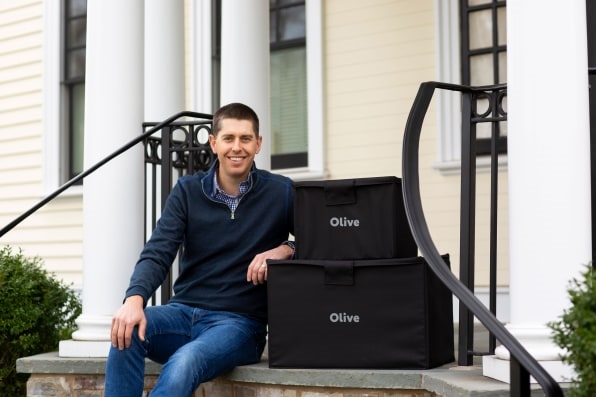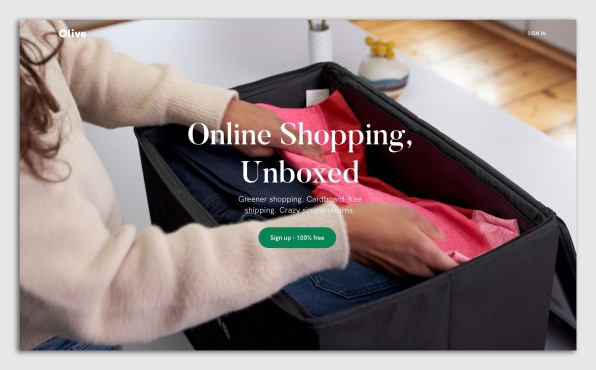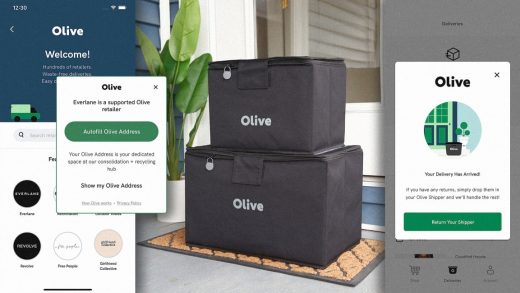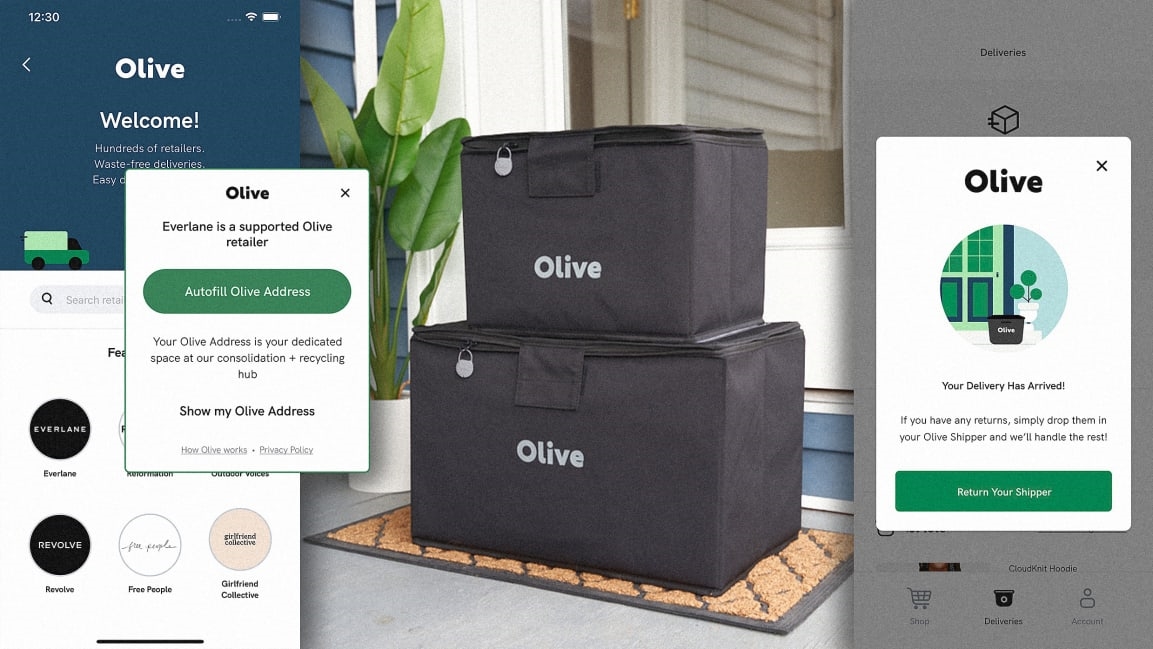Two-day shipping is terrible for the environment. This startup wants to make it a thing of the past
Since the pandemic began, recycling has become an ordeal. It takes half an hour to break down all the cardboard boxes we’ve received and haul them to the curb. I often feel horrified by the amount of waste my family generates in just one week.
A newly launched startup, Olive, wants to make online shopping more convenient and sustainable. It’s a free app and Chrome extension that allows you to combine your fashion purchases from hundreds of retailers into a single shipment. Those are then sent in a reusable box once a week. The entire process avoids all of the unboxing and waste disposal—an approach that’s more eco-friendly than the status quo.
Our obsession with two-day shipping
Olive was founded by Nate Faust, who has spent decades embedded in the world of e-commerce. In 2014, he founded Jet.com, which was acquired by Walmart two years later for $3.3 billion; he previously served as VP at Quidsi, the parent company of Diapers.com and Soap.com. While there, he helped build the logistics for Quidsi’s two-day shipping program, making it among the first retailers to give customers that option. Over the past decade, he’s seen Amazon Prime normalize two-day shipping, forcing the rest of the industry to follow suit or risk losing customers. But a decade later, he believes it’s time for a new approach.

[Photo: Olive]
During the pandemic, when consumers have relied heavily on Amazon and Walmart.com to avoid going to a physical store, the downsides of two-day shipping have become clearer. Sure, we want quick shipping for our medication or to replenish our dwindling supply of toilet paper, but we’re also getting products such as books, clothes, and toys that we don’t need immediately. “Two-day shipping prioritizes speed, so this means we’re often getting a lot of packages containing individual products,” says Faust. “One night I was taking out the trash and staring at the boxes on my curb and my neighbor’s curb and I thought, “Holy cow, how did we get here? We’ve reached a breaking point.”
These piecemeal deliveries also come with an enormous environmental footprint. Packages often arrive through different carriers, so you might get separate deliveries from USPS, FedEx, and UPS in a single day. And then there’s all the packaging: Making the boxes and plastic wrappers uses resources and releases carbon emissions. Even recycling can be resource-intensive, and that’s if boxes get recycled at all.
With Olive, Faust wants to provide an alternative to two-day shipping that offers other advantages, namely, no cardboard boxes to dispose of, along with easy returns. When you sign up, you get a weekly delivery day (mine’s Saturday). After you’ve installed the app and Chrome extension, all purchases made through Olive retailers get delivered on your specified day. When you have to return something, you put the box out on your delivery day and everything is sent back and processed. The company uses several different shipping services to deliver boxes to customers and uses USPS for returns. “The mission of Olive is undeniably sustainability, but our value proposition to the consumers and retailers is not to help the environment but because they absolutely prefer it over any alternative,” Faust says. “That’s what will ensure we achieve our mission in the long term.”
Olive makes an average 10% commission from sales made with its retail partners. Brands, meanwhile, save money on shipping: Rather than sending dozens of packages to individual customers, it can send one package to Olive’s central warehouse with many orders, and Olive separates them out for its shipments.

The long game
Olive’s model still requires a number of shipments to its warehouse; at the moment, its sustainability play is primarily by addressing the last-mile problem. By combining everything that a single customer has ordered in a week, it cuts down on the carbon required for multiple delivery trucks to visit one house each week.
When it comes to packaging, though, Olive could eventually have a bigger impact. While it currently unpacks boxes in its warehouse and recycles them, as it scales, Faust’s goal is for retailers to stop using those boxes altogether and use its reusable shipping containers instead. If a brand such as Saks Fifth Avenue has dozens of packages going to the Olive warehouse every day, it might eventually make sense for Olive to send a reusable box to carry these items back and forth, which would make the delivery process even more eco-friendly.
Faust says that he deliberately launched Olive with fashion brands, since it’s the category with the longest shipping times, which means consumers are more likely to be comfortable waiting a few days to receive their products. It also has the highest return rate across categories, which makes the easy return process more attractive. And consumers tend to buy fashion items from multiple brands, which makes Olive’s proposition more immediately relevant.
Olive launched with hundreds of brands such as Saks, Everlane, and Adidas on board. Now, Faust is actively working to partner with other retailers, including beauty and home goods brands. But in the long term, if Olive is going to make a dent in the environmental footprint of e-commerce, Amazon and Walmart would have to embrace this model. One day, Faust hopes they could even be potential partners. But ultimately, his goal is to change consumer behavior so that the convenience of consolidated deliveries outweighs the convenience of two-day shipping. “The e-commerce delivery system we have today came about through coincidental events, rather than because it is the optimal approach,” he says. “But I believe Olive’s approach is the way shopping online should work.”
(34)



